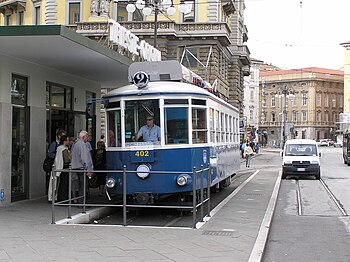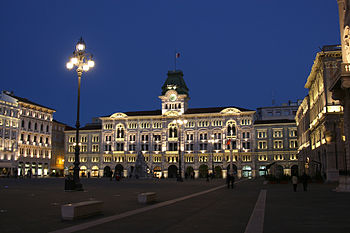| Tram in Trieste (Photo credit: Wikipedia) |
| Trieste, Italy (Photo credit: Wikipedia) |
| Central square, Trieste, Italy (Photo credit: Wikipedia) |
Yesterday I promised to keep you informed about Europe’s
border problems, so far as they have affected me. Today I can report that in
travelling this morning from Slovenia into Italy, no border intervened, no one
asked for our passports, and everything went smoothly.
Since apparently only two buses
were running during the day from the small town of Piran in Slovenia, where I
have spent the last five days --- in an effort to escape the accursed family
Christmas celebrations, but that is another story --- and since Piran
historically has been under a huge Italian influence, and was at one time
predominantly Italian in population --- I expected the traffic to Trieste, just
across the border, would be brisk.
Therefore, expecting a long queue for the bus, I struggled out of bed at
just after 5 am in order to make sure I got a seat in the bus, which was to
leave at 6.45 am. Of course, there was no one else there except my partner and
myself, and for the better part of an hour I had to run up to every bus that
turned in, to be told it was not the bus to Trieste.
Eventually the correct bus came,
on time, and we took off, slightly groggy from the rather hectic takeoff, and
in just over an hour we were in Trieste.
I had no particular expectations
of this city. But I was disappointed when our bus entered the city through what
looked like a working class district, of hillsides covered with medium-rise low-income-looking
apartment houses of indiscriminate colour and shape. Not to worry. After being put
off in the back end of the bus depot, we eventually managed to attract the
interest of a taxi --- it was 8 am, building up to the rush-hour, I guess, and
taxis were few and far between. However, this guy took us to our hotel, an
ordinary, comfortable place, where they agreed to allow us to eat breakfast,
even though we were not able to formally check in until 2 o’clock.
After a short rest we headed off,
in the general direction of the main town square. Along the way, my mind was
blown, as one might say. In one street after another pedestrians were king,
cars forbidden, and the vistas that opened up astonished me. Vast spaces, broad
boulevards, superbly decorated, coherently-composed buildings surrounding elegant,
leisurely squares, lined with chairs for sitting and having coffee or whatever
you felt like. I was back in Europe with a vengeance. It had been many years
since I had first experienced the delights of the better European cities, their
beauty, self-confidence, and immense cachet, and I immediately felt myself to
be in one of these wonderful places again. At last.
I thought of Ilya Ehrenberg’s
dictum (formulated in the very depths of the utilitarian Soviet Union) that
every man has two homes, his own, and Paris. You could extend that to any of
the better European cities, with their facility through their human scale for
making people feel that they really matter.
It has never been my way to be a
tourist wherever I have gone. Rather, I like to settle into a new place, then
mooch around its streets, finding companionable places to investigate,
comforting and warm places to sit over a glass of wine, getting a sort of feel
for the place. So I have to confess that my knowledge of Trieste and its
history is rather perfunctory, although I have gathered that it was once one of
the four premier cities of Europe, is now a medium size place of just over
200,000 with a long maritime and industrial history, and has always been,
distinctly from other Italian cities, a polyglot sort of place that has always
attracted foreigners speaking their own languages. All this is enough to
recommend any city to me.
But how, along with all this
activity, all the trauma of being at the centre between the Eastern world and
the Western world, all the continuous drama around its identity (there is still an ornamented building
blazoning the inscription right across of Free Territory of Trieste), how has
it managed to have the serenity to create such beautiful streets as I have
experienced this morning just strolling around. There is the city centre, with
its massive, ornamental public buildings; melding so effortlessly into the square
blocks of privately owned places, but not far away an even more remarkable area, the streets of the Old City, slightly rundown in appearance, at least on the outside, tucked in beside the
remains of a Roman amphitheatre. Here one finds
remarkable bookshops, crowded with tens of thousands of books (and only two, if
that, in English); and restaurants of such individuality as almost to defy
description. I have probably never been happier than a few hours ago sitting in
one of these inimitable restaurants into which one almost has to fight one’s
way past the ranks of bottles, the shouts of the proprietor from behind the bar
in conversation with one of the locals, through past the place where it is
right to have a glass of wine, into the tiny eating place itself, with only
seven tables, where I enjoyed a light lunch of mozzarella and cheese, finished
off with the most delicious tiramisu I have ever tasted.
Trieste, I am leaving you
tomorrow, but I’m already in love with you, and I really hope to return some
day.







